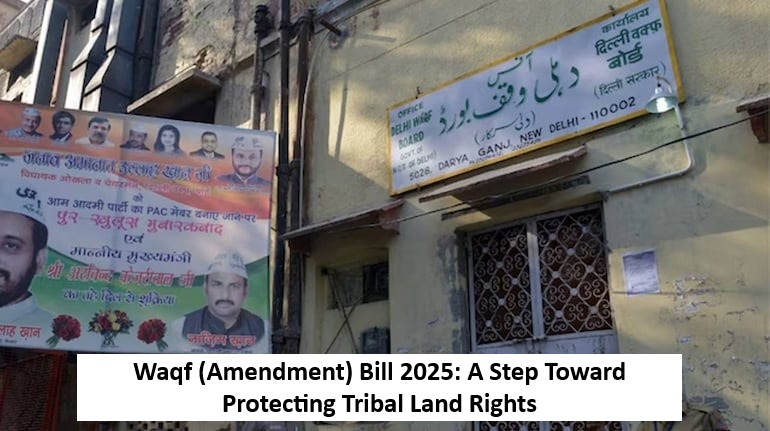
The Waqf (Amendment) Bill, 2025, introduced by the Modi government, aims to bring relief to Scheduled Tribes (STs) affected by alleged land encroachments under the Waqf Act, 1995. The issue, raised by Akhil Bharatiya Vanvasi Kalyan Ashram (ABVKA)—an RSS-inspired organization—has finally entered public and legislative discourse through a submission to the Joint Parliamentary Committee (JPC).
Land Disputes in Tribal Areas Under Waqf Act Scrutiny
ABVKA’s detailed report to the JPC outlined how tribal lands across India have been unilaterally classified as Waqf properties. It cited multiple examples where large tracts of land in Fifth and Sixth Schedule areas were allegedly taken over without following proper legal or constitutional procedures.
Key Examples Highlighting the Issue
ABVKA presented specific case studies:
Jharkhand (Ranchi): Christian institutions in tribal-dominated areas have faced Waqf Board claims, leading to legal disputes despite Fifth Schedule protections.
Andhra Pradesh (Agency Areas): Waqf Boards have made claims on land occupied by churches in tribal zones, creating conflicts over rightful ownership.
Odisha (Koraput, Mayurbhanj): Disputes have arisen due to old land records being misinterpreted, resulting in overlapping claims between tribal communities and religious institutions.
Chhattisgarh (Bastar): Local communities have raised concerns about conversions and land acquisitions that bypass Schedule V land protections.
North-East (Carbianlong, Garo Hills): Similar issues have emerged under Sixth Schedule jurisdictions.
Legal and Constitutional Concerns Raised by ABVKA
ABVKA claims that the Waqf Act, in its current form, disproportionately empowers Waqf Boards—often at the expense of tribal land rights. It argues that such declarations violate constitutional safeguards under Schedule V and VI, which prohibit land transfers to non-tribals in Scheduled Areas.
They have recommended a full review of all properties designated as Waqf in these regions. According to the ABVKA, such properties—be they mosques, churches, or religious sites—must be reassessed and, if illegally held, restored to tribal owners.
New Bill Includes Tribal-Specific Safeguards
Thanks to ABVKA's consistent efforts, the Waqf (Amendment) Bill, 2025 now includes provisions aimed at protecting tribal land rights. This is the first time that the issue of tribal land under Waqf jurisdiction has been given significant attention in a national legislative framework.
Lack of Public Awareness and Media Coverage
Despite its importance, the issue has largely been absent from mainstream and social media discourse. Public intellectuals and opinion leaders have often overlooked the complexities tribals face in land disputes involving religious institutions.
The ABVKA’s push for legal safeguards reflects a growing awareness that indigenous communities need dedicated protection from institutional overreach.
Read More: They Call It Progress, We Call It Betrayal Why Rahul Gandhi is Fuming Over the Latest Arrests

 Share
Share_1820244660_100x75.jpg)
_365039172_100x75.jpg)
_1405734818_100x75.jpg)
_822217780_100x75.jpg)
